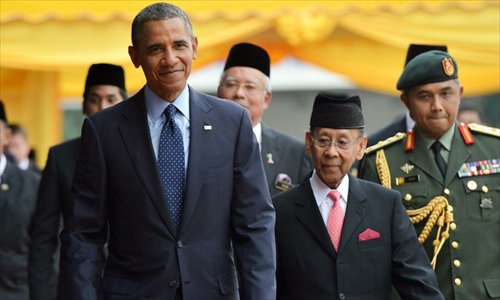Malaysia unlikely to alter delicate balance

US president Barack Obama arrived Saturday for a three-day state visit to Malaysia, during which he will discuss issues bilateral trade and regional affairs.
The US Sunday upgraded its ties with Malaysia during President Barack Obama's Asia tour in a move intended to reassure allies of Washington's commitment to a strategic pivot to the region against the backdrop of China's current rise.
Obama arrived in Kuala Lumpur Saturday following visits to Japan and South Korea. The last leg of his trip will take him to the Philippines on Monday, where a new bilateral security pact will be inked but not as a "counter to Chinese assertiveness" according to a US official.
Obama became the first serving US president to visit the Muslim-majority country in nearly five decades.
Malaysian Prime Minister Najib Razak said he and Obama agreed to upgrade ties to a "comprehensive partnership" at a joint news conference following their talks on Sunday.
The upgraded ties came after the announcement of a "comprehensive strategic partnership" between China and Malaysia during Chinese President Xi Jinping's visit to Kuala Lumpur last October.
"Malaysia is a very important stop for Obama's Asia trip as the US implements its policy of a 'pivot toward Asia,'" said Qu Xing, director of the China Institute of International Studies.
Some analysts see Obama's visit to Malaysia, a close trading partner of China, as a strategy to dilute China's influence in Southeast Asia.
China, Malaysia, the Philippines, Vietnam and Brunei have overlapping claims in the South China Sea. Unlike Manila, Kuala Lumpur has been less vocal in its territorial dispute with China.
"On the South China Sea, President Obama and I both stressed earlier the importance of upholding universally recognized principles of international law, including the United Nations Convention on the Law of the Sea," Najib told the press conference. "We agreed that the full implementation of the Declaration on the Conduct of Parties was vital, and that an effective Code of Conduct would enhance mutual trust."
Qu said that the statement suggested a balanced attitude and showed that Malaysia is trying to avoid confrontation with China on this issue. "Malaysia's attitude toward this territorial dispute has been consistent and low profile," Qu added.
"Malaysia, like many other Southeast Asian nations, is no stranger to the delicate balance between the US and China in the region over the past few years," Ei Sun Oh, a political analyst and former political secretary to Najib, told the Global Times.
The traditional bifurcated foreign policy of economically aligning to China and security-wise being dependent on the US is not likely to change in the foreseeable future, he added.
In his town hall speech in Kuala Lumpur on Sunday, Obama tried to convince Asian partners that Washington is serious about its promised strategic "pivot" to Asia.
"We want to work with old allies and worthy partners and with China," he said. "We want to see a peaceful rise to China."
Meanwhile, White House officials travelling with Obama said a new security accord allowing for the enhanced "rotational presence" of US forces in the Philippines will be signed when the leader arrives in Manila Monday.
The officials said it is not a return of US military bases, but will allow US forces to train and conduct exercises with Philippine forces for maritime security, disaster assistance and humanitarian aid.
"We're not doing this because of China," Evan Medeiros, Obama's top Asia advisor, said when asked if the pact is meant as a deterrent to China.
Shen Minghui, a researcher with the Institute of Asia-Pacific Studies, said that Obama's Asia visit focused mostly on pushing forward the delayed 12-nation Trans-Pacific Partnership (TPP) trade pact.
Prior to his visit to Malaysia, Obama failed to clinch a trade deal in Japan which would have injected momentum into the pact. While in Malaysia, Najib suggested that his country remains far from ready to sign the trade pact due to domestic "sensitivities."
"Malaysia's consideration about the TPP has to do with its concerns on economic development and domestic issues rather than international politics," Shen said.
Reuters contributed to this story
Newspaper headline: Obama bolsters ties with KL in Asia pivot